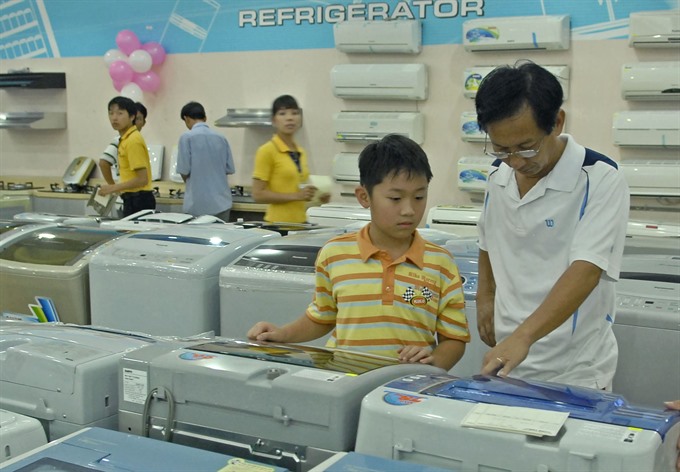 Society
Society

Authorities are alarmed at the declining fertility rates in HCM City and southern provinces.
 |
| A father and son in HCM City shop for household appliance. — VNA/VNS Thế Anh |
HCM CITY — Authorities are alarmed at the declining fertility rates in HCM City and southern provinces.
The issue was brought to the forefront following comments by the Secretary of the HCM City Party Committee this week encouraging more births in the country’s largest metropolis.
Phạm Thị Mỹ Lệ, deputy head of the HCM City Department of Population and Family Planning, said total fertility, or the number of births per woman, was 1.45 in 2015 – significantly lower than the national replacement fertility rate of 2.1 for the country. Similar rates have been observed throughout the southeastern region as well as 13 provinces of the Mekong Delta region, with fertility rates hovering at around 1.8 and 1.9, respectively – two regions with the lowest fertility rates in the country.
For a small country that occupies 14th place in the global ranking in terms population and has already posted a stable annual population increase of over 1 per cent in the last decade, clamouring for more childbirths seem counter-intuitive.
However, experts are concerned because the low fertility in the south is occurring even though this region is more developed and people can afford the costs of child-rearing. On the other hand, the Red River Delta region (barring the capital city of Hà Nội) does not enjoy the same level of development as HCM City, the southeastern region and Mekong Delta region, but posted a fertility rate of 2.3 and the trend is looking up. The same thing is true of mountainous areas in the north or Central Highlands, with their remote locations and high concentration of ethnic minorities, suffering economic hardship.
Low fertility rates in more developed areas, such as HCM City, the biggest economic hub of Việt Nam, are attributed to high living costs as well as high demands of the population regarding education and other child-rearing aspects. In addition, the number of women waiting longer to get married and bear children due to job pressures, or those who decide not to bear children, are also on the rise as modernisation and urbanisation expands.
Two children each
This situation has made authorities in some localities change their motto to “every couple should have two children,” from the previous “a couple should bear one or two children for better rearing.”
Two children in one family will help prevent the undesired “4-2-1 pyramid structure”, where a sole child is expected to care for four grandparents (both on his/her mother’s and his/her father’s side) in addition to his/her parents, Nguyễn Việt Tiến, Deputy Minister of Health, said.
Secretary Nguyễn Thiện Nhân told the media after a HCM City People’s Council meeting that Government efforts to maintain replacement fertility in the last decade are important for the so-called "golden population" period – where for every two people of working age, there is one dependent person, and is considered by the United Nations as the once-in-a-country’s lifetime "golden opportunity" for socio-economic development.
Nhân said HCM City already has a balanced gender ratio of childbirths, but the city’s declining fertility rate might spell a negative future for the country if the fertility rate fails to counter the ageing process. An ageing population would leave the country short of labour, adversely impacting the economy and a progressively onerous burden on the country’s social security system.
However, it should be said that family planning will not be forgone in favour of increasing fertility rates, at least for the time being, since the government has not yet officially allowed HCM City to conduct “birth promotion” measures. In the meantime, local media will be tasked with “calling for the city’s citizens to be dutiful to the two-child policy.”
The national policy should be “malleable” to adapt to each locality’s situation, said health deputy minister Tiến.
Childbirth is not just a familial private matter but also a “national concern that decides the existence of a country,” as Secretary Nhân once said. — VNS




